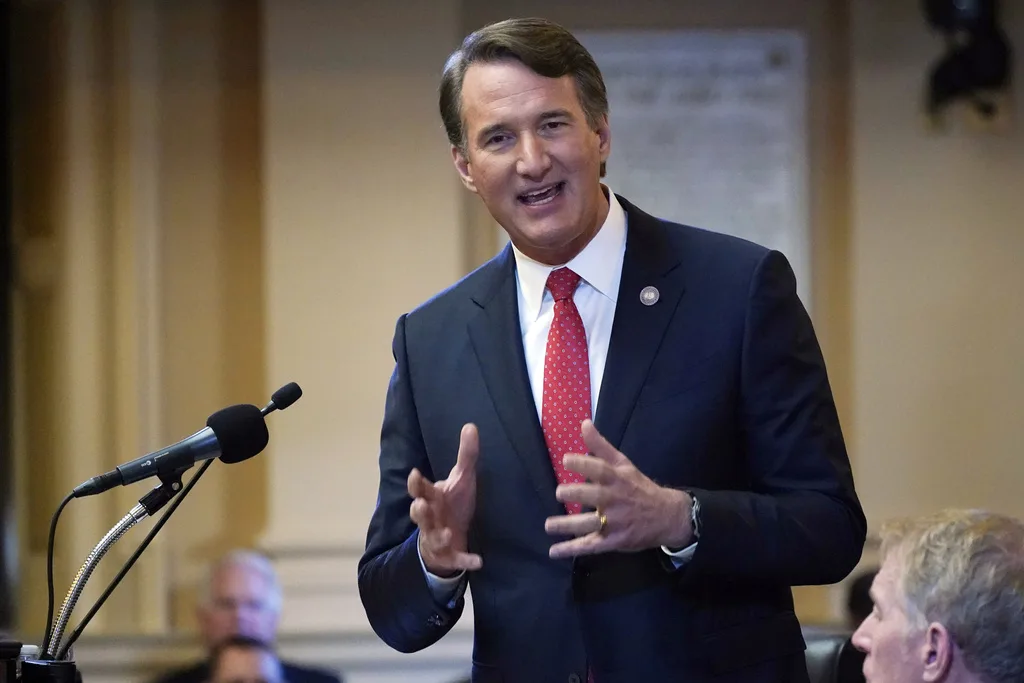
FILE - Gov. Glenn Youngkin delivers his State of the Commonwealth address before a joint session of the Virginia General Assembly, Jan. 10, 2024, at the state Capitol in Richmond, Va. Gambling regulations, school construction and the state budget were on the agenda for Virginia lawmakers returning to Richmond on Wednesday, April 17, to consider Youngkin’s proposed amendments to legislation and his record number of vetoes. (AP Photo/Steve Helber, File)
The Problem
Governor Glenn Youngkin introduced 233 amendments to the bipartisan budget so it was hard to know how to assess his budget–for example, he took retirement funds out of the school buildings and repairs budget. To make it even more difficult, the General Assembly and Youngkin just agreed to scrap the budget and start from scratch.
Youngkin’s administration has been fraught with various forms of misrepresentation, from iffy sole source consultant procurement practices to stacking commissions and boards with conflict of interest candidates, but no initiative has been more flawed than his dream project to establish 20 charter/Lab schools.
Governor Youngkin is determined to open the gates for creating independently run but publicly funded charters in the state of Virginia, and to place authorization firmly at the state level. His appointees are scrambling to convince universities to submit applications and are changing the approval process to ensure they can establish as many as possible before the deadline (June 30) to use up the $85 million he set aside for Charter-Lab school implementation.
Charter-Lab School Debacle
Despite Education Secretary Guidera’s 2022 promise to open Charter-Lab schools by Fall 2023 at universities across the Commonwealth, only one of 13 Lab Schools were opened by January 2024—the VCU-CODEVA program that actually incorporated two programs that had already existed.
Secretary Guidera has talked about 23 schools that will serve 4000 students. But the reality is less than one-third of her projection. Only seven universities had moved forward to apply for an actual implementation grant. Additionally, the legislature declined to reauthorize the remaining $85 million in seed money due to expire on June 30–it is suspected this was in response to the failure of this program. In a last ditch effort to reinvigorate the initiative, Youngkin and Secretary Guidera launched another media blitz, and his appointed five-person Lab School standing committee voted to by-pass first review of applications to expedite quick approvals.
From the beginning, refusal to abide by the Lab-Charters restrictions has bordered on violation of the laws. To get the budget seed money of $100 million, the initial agreement between the administration and the legislature were for lab schools sponsored by the 14 public four-year universities joining with local school districts. However, the Lab-Charter committee and Board of Education have expanded eligibility to 23 community colleges, 5 state regional Centers, and 27 private universities including Liberty University, Marymount University, and George Washington University. The partnering units are now virtually any post-high school institution and partnering entity (i.e., school district or a private company) of their choice. Yet here we are in April, and this $100 million must be spent by July 1, 2024 or be returned to the general fund.
The stated goal of the Charter-Labs has been to create innovative career plans and to serve under-served or at-risk students. However, most of the applications piggy back on programs that already exist such as AVID, Dual Enrollment, Coding, and career Health Science courses. Also, the lottery selection process for “at-risk” students is unclear in some of the programs. Thus, they are not innovative and it is unknown if they will serve the targeted populations.
Another concern is staffing costs, including expensive directors serving a small population of students. For example, many of the 7 applicants expect to employ a full-time Executive Director and substantial implementation staff (6-8) while still relying on college student interns and the local district teachers to supply core instruction.
Juxtaposing Cost and Program Efficacy
Gov. Youngkin’s budget amendments cut the At-Risk Add-on which would serve 247 of the lowest income communities (over 123,000 students) across the commonwealth from $300 million to $96 million (the current level of funding), while the Charter-Lab $85 million would serve under 1,000 students in year one, and under 1,500 in year two. Thus, we as taxpayers need to ask, “Will Charter-Lab schools serve the most students better than current programs?”
Current programs include:
- According to JLARC, 42,000 students already take Dual Enrollment Courses each year.
- 16 of the Virginia community colleges offer an Associates degree in Early Childhood Development (pre-K teacher training).
- 5,662 students now take AP computer science courses and 785 students take CodeVA programs or workshops.
- There are 89 AVID sites in Virginia schools which would reflect approximately 1,700 or more students.
- 24 Community College sites across Virginia offer welding programs.
- Virginia currently has nine Governor’s Health Science Academies which provide Health Sciences career and technical education.
However, if we already have most of these programs available, why create a completely separate administrative staff and pseudo-schools to serve such a small sample of students, students who would probably be the enrollees for the existing programs?
Politics

Birth control protections await action by Youngkin
Republican Gov. Glenn Youngkin has until May 17 to block or sign into law stronger legal protections for people to access contraception The fate of...

VIDEO: Prescription drugs are getting cheaper for seniors thanks to Biden’s Inflation Reduction Act
Prescription medication costs are falling by the thousands this year for more than a million American seniors due to President Biden’s Inflation...
Local News

The zodiac signs of 12 iconic women offer insight into their historic accomplishments
Zodiac signs can tell you a lot about someone’s personality. Whether they’re an earth, water, air, or fire sign, these 12 categories (which are...

Virginia verses: Celebrating 5 poetic icons for National Poetry Month
There’s no shortage of great writers when it comes to our commonwealth. From the haunting verses of Edgar Allan Poe, who found solace in Richmond's...





